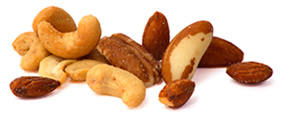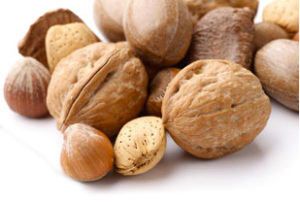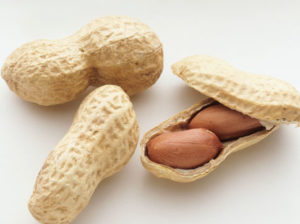 I've been asked whether vegan diets are safe during pregnancy. And I've always said that I don't know, but that avoiding all meat, fish, eggs, and dairy concerns me. Vegan diets are diets without meat, fish, dairy, honey, and eggs (no animal derived food), but while vegetarian diets also avoid meat, they do include eggs, honey, milk, and dairy products. Thus it is very important that anyone following a vegan diet plan meals carefully to get all the necessary nutrients. For example, soda and french fries are vegan, but are not good nutritionally.
I've been asked whether vegan diets are safe during pregnancy. And I've always said that I don't know, but that avoiding all meat, fish, eggs, and dairy concerns me. Vegan diets are diets without meat, fish, dairy, honey, and eggs (no animal derived food), but while vegetarian diets also avoid meat, they do include eggs, honey, milk, and dairy products. Thus it is very important that anyone following a vegan diet plan meals carefully to get all the necessary nutrients. For example, soda and french fries are vegan, but are not good nutritionally.
There are a number of nutrients that probably need to be supplemented in vegan diets during pregnancy, especially B-12, iron, zinc, iodine (can get by using iodized salt), and omega-3s, and that's not even discussing micronutrients. So it was good to see this article by Dr. Drew Ramsey (Columbia University, NY) raising those same concerns about nutrient deficiencies during pregnancy, and pointing out that very few studies have looked at vegetarian and vegan diets in pregnancy - that the evidence is "scant". This topic is so controversial that as of today there were 85 comments by health professionals after the following Medscape article - both strongly pro and con, and studies given that show that vegans tend to have lower levels of a number of nutrients measured (zinc, iron, omega-3s, etc).
There are also reports of babies exclusively breast-fed by vegan mothers (here and here) who did not take vitamin supplements that developed nutritional deficiencies (especially B-12, vitamin K, and vitamin D). This is because what a mother eats is what the baby gets during pregnancy and breast-feeding.
On the other hand, the Academy of Nutrition and Dietetics came out with a position statement in 2016 stating that "appropriately planned vegetarian, including vegan, diets are healthful, nutritionally adequate, and may provide health benefits for the prevention and treatment of certain diseases. These diets are appropriate for all stages of the life cycle, including pregnancy, lactation, infancy, childhood, adolescence, older adulthood, and for athletes". But that article (in the Journal of Academy of Nutrition and Dietetics) then goes on in depth about several nutrients that can be lower or deficient in vegan diets unless supplements are given (B-12, iodine, etc). From Medscape;
Are Vegan and Vegetarian Diets Safe During Pregnancy?
Are vegan and vegetarian diets safe during pregnancy?....Vegan and vegetarian diets are plant-based diets....Plants, in general, are a great choice, especially colorful plants, because they tend to be more nutrient-dense. Plant-based diets have been linked to a number of health benefits, such as lower body mass index and lower rates of obesity and diabetes, as well as conferring some benefits. Certainly, vegan and vegetarian diets have higher amounts of certain nutrients like magnesium, folate, and fiber, all of which are generally consumed in very low quantities in Western diets.
Focusing on pregnancy, there are two important papers to note. The first, which got me very interested in this issue, was a series of pooled case reports by Drs Dror and Allen in 2008.[1] They looked at 30 cases of severe vitamin B12 deficiency during pregnancy in vegan women with pernicious anemia. Among the 30 vegan women who had B12 deficiency during pregnancy, about 60% of their offspring had severe developmental delays and 37% had cerebral atrophy.... The clinical importance of this is to partner with our patients who are eating plant-based diets and ensure that they have adequate levels of vitamin B12, as well as iron, zinc, and long-chain omega-3 fats during pregnancy.
The second article to take a peek at is from the British Journal of Obstetrics and Gynaecology in 2015.[2] This was a systematic review that looked at all of the literature after screening out the papers. The authors found about 13 papers focusing on maternal and infant outcomes, and about nine of those looked at nutrient deficiency. The main headline of this review is that there are no randomized clinical trials of vegan or vegetarian diets in pregnancy. It is very hard to make a clear clinical recommendation. The epidemiologic data were heterogeneous. As the researchers called it, it was "scant." That is certainly true. Overall, there were no clear associations with bad outcomes. There was some increased risk for hypospadias in one of the larger trials that looked at vegan and vegetarian diets during pregnancy.
The main concern is that vegan and vegetarian diets put patients at risk for a number of nutrient deficiencies—vitamin B12 in vegan diets (and even for vegetarians), iron, zinc, and the long-chain omega-3 fats. Just a quick moment on the long-chain omega-3 fats: Dietarily, these only come from fatty fish and seafood. They are bioconcentrated. They start in algae, but they get bioconcentrated in our food supply via seafood. It is very hard to get those during pregnancy. Certainly, a lot of healthy babies have been born to vegetarian and vegan women. You can supplement, but given the benefits we see with omega-3 fats in patients with things like mood disorders or a history of psychotic disorders, I think it is important to consider the long-chain omega-3 fats. If someone is not going to get those in their diet but has a history, risk, or propensity toward mood disorders, think about supplementation.
Excerpts from the review study (mentioned above) in BJOG: Vegan-vegetarian diets in pregnancy: danger or panacea? A systematic narrative review.
To review the literature on vegan-vegetarian diets and pregnancy outcomes [in healthy pregnant women]....None of the studies reported an increase in severe adverse outcomes or in major malformations, except one report of increased hypospadias in infants of vegetarian mothers. Five studies reported vegetarian mothers had lower birthweight babies, yet two studies reported higher birthweights. The duration of pregnancy was available in six studies and was similar between vegan-vegetarians and omnivores. The nine heterogeneous studies on microelements and vitamins suggest vegan-vegetarian women may be at risk of vitamin B12 and iron deficiencies.
CONCLUSIONS: The evidence on vegan-vegetarian diets in pregnancy is heterogeneous and scant. The lack of randomised studies prevents us from distinguishing the effects of diet from confounding factors. Within these limits, vegan-vegetarian diets may be considered safe in pregnancy, provided that attention is paid to vitamin and trace element requirements.

 New research further confirms a link between higher lutein levels (as measured in the blood) and the
New research further confirms a link between higher lutein levels (as measured in the blood) and the  Magnesium is a mineral found in the human body that is necessary for good health. New research analysed 40 studies and found that a diet rich in magnesium is associated with a reduced risk of stroke, heart failure, diabetes, and death ("all cause mortality").
Magnesium is a mineral found in the human body that is necessary for good health. New research analysed 40 studies and found that a diet rich in magnesium is associated with a reduced risk of stroke, heart failure, diabetes, and death ("all cause mortality"). A large
A large  It turns out that scurvy and vitamin C deficiency is still around these days. Scurvy is a disease resulting from a lack of vitamin C. Most animals can synthesize vitamin C, but not humans. We must eat foods containing vitamin C to get the vitamin.
It turns out that scurvy and vitamin C deficiency is still around these days. Scurvy is a disease resulting from a lack of vitamin C. Most animals can synthesize vitamin C, but not humans. We must eat foods containing vitamin C to get the vitamin. As you may have noticed, I write about the beneficial bacteria Lactobacillus sakei a lot. This is because it has turned out to be a great treatment for both chronic and acute sinusitis for my family and others (see post
As you may have noticed, I write about the beneficial bacteria Lactobacillus sakei a lot. This is because it has turned out to be a great treatment for both chronic and acute sinusitis for my family and others (see post  A thick mucus layer (green), generated by the cells of the colon's wall, provides protection against invading bacteria and other pathogens. This image of a mouse's colon shows the mucus (green) acting as a barrier for the "goblet" cells (blue) that produce it. Credit: University of Michigan
A thick mucus layer (green), generated by the cells of the colon's wall, provides protection against invading bacteria and other pathogens. This image of a mouse's colon shows the mucus (green) acting as a barrier for the "goblet" cells (blue) that produce it. Credit: University of Michigan This study found impressive results - improvement in autistic behaviors in children diagnosed with autism spectrum disorder (ASD) with four months of daily vitamin D supplementation. Children in the
This study found impressive results - improvement in autistic behaviors in children diagnosed with autism spectrum disorder (ASD) with four months of daily vitamin D supplementation. Children in the  Guidelines for how to prevent food allergies in children are changing. Until very recently, it was avoid, avoid, avoid exposing babies or young children to any potential allergens. Remember parents being advised that if an allergy to X (whether pets or food) runs in the family, then absolutely avoid exposing the child to the potential allergen? Well, recent research (
Guidelines for how to prevent food allergies in children are changing. Until very recently, it was avoid, avoid, avoid exposing babies or young children to any potential allergens. Remember parents being advised that if an allergy to X (whether pets or food) runs in the family, then absolutely avoid exposing the child to the potential allergen? Well, recent research ( An article points out what we should all be concerned with, but is being ignored - pesticide residues of glyphosate (found in Monsanto's Roundup) and 2,4-D in foods. Glyphosate is the most used pesticide in the world, and both glyphosate and 2,4-D pesticide residues in food are set to really increase with the introduction of
An article points out what we should all be concerned with, but is being ignored - pesticide residues of glyphosate (found in Monsanto's Roundup) and 2,4-D in foods. Glyphosate is the most used pesticide in the world, and both glyphosate and 2,4-D pesticide residues in food are set to really increase with the introduction of